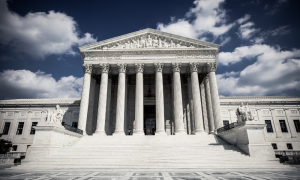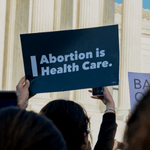
Birth Control Prescriptions Are Down in States with Abortion Bans
Women in states with restrictive abortion laws have few options today. And yet the prescriptions for birth control methods has fallen since the Dobbs decision.

There is another update to the ongoing court battle over mifepristone, one of two drugs used in most medication abortion. As some may remember, by April three different courts had weighed in on two cases involving the drug, and the conflicting decision had people across the country confused as to whether medication abortions were still possible even in states where abortion remained legal.
One of the confusing decisions came from District Court Judge Matthew Kacsmaryk’s of Texas who agreed with a group of doctors calling themselves Alliance for Hippocratic Medicine. Their case argued that the process used to approve mifepristone over 20 years ago was unlawful, and that approval should be rescinding. They further argued that more recent changes (in 2016 and 2021) that expanded access had been done without careful consideration of safety and should also be rescinded.
Despite years of evidence that mifepristone is safer than Tylenol or Viagra, Kacsmaryk agreed with the plaintiffs that the drug should not have been approved and that the more recent rule changes should also be overturned. Among other spurious arguments, the judge said that the new rules violated the Comstock Act of 1873 which forbid sending “obscene” materials, including contraception, through the mail.
His decision was immediately appealed to the Fifth Circuit Court of Appeals which issued an emergency decision agreeing with part, but not all, of Kacsmaryk’s ruling. The appeals court said it was too late to question the original approval of the medication but agreed that the newer rules should be rescinded. They also cited the Comstock Act.
Had this decision been allowed to take hold, even in states where abortion remains legal, mifepristone would only have been available up to 7 weeks of pregnancy (as opposed to 10 weeks) and could not be delivered by mail order.
At the end of April, the Supreme Court issued a stay that put a pause on this decision going into effect. SCOTUS did not discuss the merits of the case. Instead, it sent the case back to the Fifth Circuit for a full review. To avoid ongoing confusion as there are other related case also wending their way through the courts, the Supreme Court said that the stay would remain in place until it decided whether to hear a case on this issue.
Last week, the Fifth Circuit released its full decision in the case which, not surprisingly, echoed what it had said in the spring. The Fifth Circuit is known to be very conservative and the three judges who heard this case had ruled against abortion rights in the past.
Again, the Supreme Court’s stay means that nothing changes yet, but the Fifth Circuit’s most recent decision makes it even more likely that the highest court will hear this case at some point soon. Nearly half of all abortions in this country are medication abortions and that may be increasing as providers in states where abortion is still available become more and more overwhelmed. The Supreme Court’s decision on this case will have significant ramifications for abortion access as well as the future of the FDA’s authority to regulate drugs.
For a more thorough discussion of the mifepristone court cases and how we got to this point please see this article.

Women in states with restrictive abortion laws have few options today. And yet the prescriptions for birth control methods has fallen since the Dobbs decision.

The U.S. Supreme Court overruled a lower court decision that would have made mifepristone harder to get even in states where abortion remains legal. But the decision doesn’t mean the court is softening its stance on abortion rights.

Mifepristone is one of two pills used in medication abortions. Conflicting court decisions have threaten the availability of this abortion drug.

Following a decision from the U.S. Food and Drug Administration (FDA) released on January 3, 2023, pharmacies will be allowed to offer mifepristone—a drug used for medication abortion—for the first time.

With the end of Roe v. Wade, abortion is now illegal in several states, but not nationwide. There are still many states in which abortion is, and will remain, legal. Learn more about the current status of safe, legal abortion access, as well the implications

Texas Abortion Law Threatens Reproductive Rights Abortion rights, often under fire, are facing the most serious attack since the passage of Roe v. Wade. The American Sexual Health Association decries the recently passed horrific restrictions to abortion access in Texas, compounded by the Supreme Court’s
ASHA believes that all people have the right to the information and services that will help them to have optimum sexual health. We envision a time when stigma is no longer associated with sexual health and our nation is united in its belief that sexuality is a normal, healthy, and positive aspect of human life.
ABOUT
GET INVOLVED
ASHA WEBSITES
GET HELP
© 2024 American Sexual Health Association